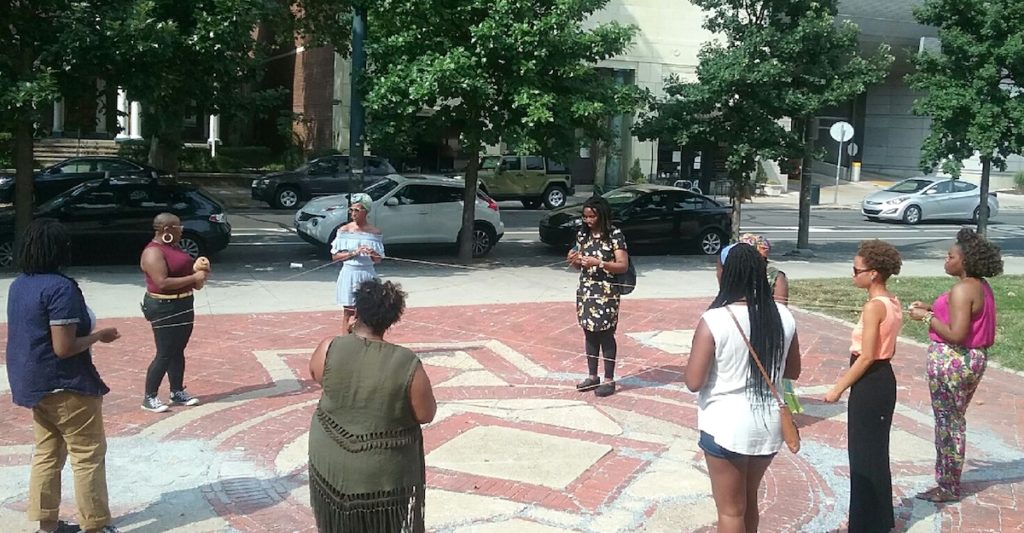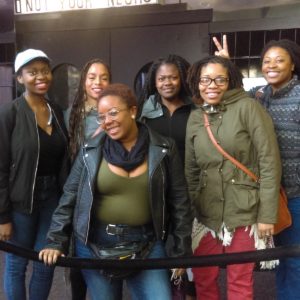Womanist Working Collective’s LaTierra Piphus on navigating systems in order to dismantle them
 June 11, 2018
Category: Feature, Featured, Long, Method
June 11, 2018
Category: Feature, Featured, Long, Method
Disclosures
Correction: The number of Reciprocity members and some description of funding goals have been updated. (6/12, 5:05 p.m.)When Womanist Working Collective (WWC) co-organizer LaTierra Piphus applied for 8 80 Cities’ Emerging City Champions fellowship last year, she knew she would have to leave some things out.
A fellow collective member who is active in nonprofit development work encouraged Piphus to apply for the fellowship, which included a $5,000 Knight Foundation-funded grant, to support the social action cooperative’s Reciprocity time banking project after haphazardly discovering the opportunity.
“I don’t think I would’ve gotten accepted had I elaborated on the importance of it in terms of the historical and cultural context for us,” said Piphus. “For grant purposes there’s certain audiences that you have to perform to and structure your requests for. The fellowship was the same way.”
But WWC has nothing to hide. A visit to the collective’s website reveals its vision and mission: improving the quality of life of Black cis and trans women, femmes and gender-nonconforming people via self-care, philanthropy and community organizing.
WWC’s central principles are influenced by the teachings of those who’ve traversed the waters of radical Black womanhood before them: Audre Lorde, Fannie Lou Hammer and Alice Walker, to name a few.
“We might have mentioned capitalism lightly, but definitely didn’t mention how white supremacy is connected to the capitalism and the imperialism, and patriarchy,” said Piphus of the fellowship application and sounding very much like cultural critic bell hooks. “We definitely didn’t lay out all of the systems of oppression that we’re seeking to dismantle.”
Reciprocity, now a permanent program, speaks to the collective’s aim to dismantle those oppressive systems by way of establishing self-sustaining, and ecologically and economically just, communities of color. It’s a practical system that enables its 31 members and adjacent community affiliates to exchange time spent on services provided, rather than money, whether the individuals providing services are doctors or stay-at-home parents.
The year-long fellowship is set to end in July, but Reciprocity is just getting started.
“I would say one of the measures of success is how many relationships are being built and how many members are actually able to connect with each other, find commonalities, find support with another member that they might not have taken the opportunity to get to know,” said Piphus.
“One of the important things about divesting from capitalism and imperialism and neoliberalism is looking at how we’re defining success, efficiency, productivity and really decolonizing a lot of that shit,” she said. “If we were to begin to operate in terms of what capitalism tells us is successful then we’ve already failed.”
Although Piphus is technically the creator and founder of the Womanist Working Collective, she and co-organizer Joanna James have adopted their titles to not only highlight what their roles are within the group, but also as a means of emphasizing the collective’s rejection of an implied hierarchal structure.
Membership meetings usually consist of organizational updates, coverage of upcoming events and opportunities, and even small study group sessions. At the most recent quarterly retreat, the group revealed its 2018-2020 Strategic Plan.
That plan includes implementing a new safety net program that aims to address the relative lack of generational wealth amongst mainly matriarch-led communities of color via a mutual support fund for members in need.
“The safety net project is to help redistribute resources,” said Piphus. “Eventually this project will be sustained by reparations, so for now we are working just to have it sustained by general donations. We don’t have a lot of support.”
Although WWC just earned fiscal sponsorship from CutureTrust Greater Philadelphia in July 2017 and a $10,000 grant from the Bread and Roses Community Fund’s Black-led, Black-centered fund in March, the “Non-Profit Industrial Complex” is yet another system the collective wants no parts of. The group hopes to someday get its funding mainly from unrestricted sources.
For Piphus and the collective, the only end game is Black liberation:
“We’re trying to move past the idea that we should just be surviving here on this Earth. There are a lot social determinants that impair our quality of life, and dismantling systems helps further that process so we can enjoy the work that we’re doing, so we can build healthy relationships, so we can move in our purpose whatever that is on this Earth — move toward being more self-actualized, toward enjoying the lives that we were given. It’s hard to do that when your whole life is surrounding around survival. You know?”
_
Full disclosure: Generocity Editor Julie Zeglen participated in the Fall 2017 cohort of Bread & Roses Community Fund’s Giving Projects, which collectively funded $10,000 grants for several Black-led, Black-centered social justice organizations, including Womanist Working Collective. That relationship is unrelated to this article.
Trending News











